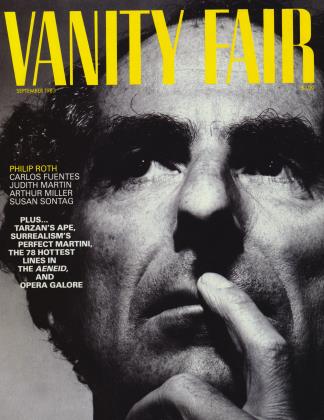Sign In to Your Account
Subscribers have complete access to the archive.
Sign In Not a Subscriber?Join NowCLASSICAL MUSIC
WEBERN/TAKEMITSU, by Tashi; Peter Serkin, piano (RCA). Anton Webern, a quiet, mystical man who died in 1945 in the Austrian Alps, built his music on visions of nature. The Webern we’ve heard more about perhaps is the twelve-tone pedant, in whose music (to quote from a wellknown study) “the compositional events unfold in terms of expanded serial relations.”
Webern needs to be saved from his current friends, who play his work as if “compositional events” mattered more than music. This record helps. The members of Tashi are new-music specialists who aren’t only new-music specialists; they play Webern with the same love they’d bring to Mozart or Debussy. For once the First movement of the Piano Variations sounds like the ghostly echo of a Brahms intermezzo that Webern meant it to be; the second movement sounds as witty as its model, the Badinerie from the second Bach orchestral suite (but it doesn’t lose its machine-age clang). Ida Kavafian and Peter Serkin play the Four Pieces for violin and piano with overflowing hearts, though still on the edge of silence. Best of all, the Quartet sounds for once like music.
GREGORY SANDOW
COMPLETE WORKS FOR SOLO PIANO BY LEONARD BERNSTEIN, James Tocco, piano (Pro Arte). If you didn’t know who wrote this music, hearing it you might think, “A real craftsman. Unpretentious. Really knows the piano.” Modest praise: but a plus for Bernstein, who as a classical composer (his Broadway stuff is another story) gets no respect from the* serious wing of the music world. Too bad; these little pieces, mostly just a minute or two long, are far better than much of the atonal work the serious crowd has been pushing.
It should be said, however, that the music isn’t all that good. Bernstein calls most of these pieces “anniversaries”; they’re portraits, more or less, tributes to friends ranging from Serge Koussevitzky (Bernstein’s mentor) to Stephen Sondheim. “Lenny may disagree with me,” James Tocco says, “but one finds much more about him in the anniversaries than the people to whom they are dedicated.” Not a plus.
Tocco does play cleanly; the music is fine, with odd turnings here and there, and unexpected moments of tenderness.
U.S.
 View Full Issue
View Full Issue












Subscribers have complete access to the archive.
Sign In Not a Subscriber?Join Now